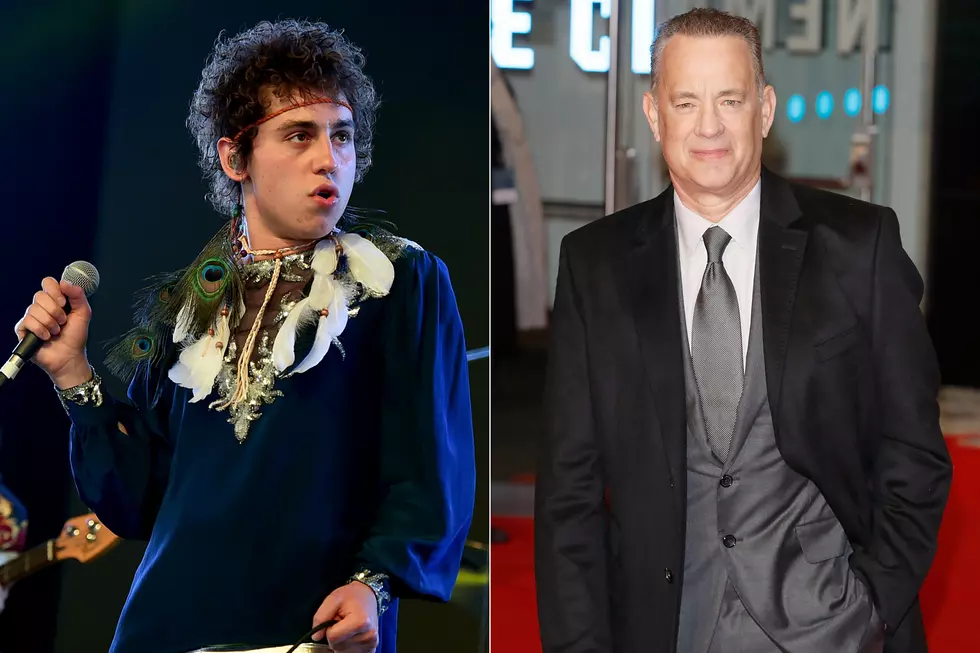
Jeff Pilson on His Role as Catalyst, Sideman, Peacemaker and Producer With Foreigner, Dokken and Others: Exclusive Interview
In a way, every step along this journey prepared Jeff Pilson for his current destination. As he collected experiences, he was also positioning himself to become a kind of rock music Swiss Army knife.
"I'm kind of busy," Jeff Pilson laughs after running down the list of his current and upcoming projects, and trying to imagine how he'll juggle everything is enough to make a person's head spin. But then, a crowded schedule goes with the territory when you're one of rock's most in-demand producers and players, and that's a status Pilson has definitely earned over the last several decades.
You may not know him by name, but you've probably heard his work, which runs the gamut from his early days with Dokken to his current status as a member of Foreigner, to his work as producer for a growing list of acts that includes Last in Line and Starship.
Pilson's talents started turning heads in sixth grade, when a couple of his schoolmates heard him singing on the playground and invited him to join their band. Already bitten by the rock bug after watching the Beatles play on The Ed Sullivan Show, he agreed — and because the group needed a bass player, that was the instrument he took. The process might have been a little arbitrary — and to that point, his only real musical background consisted of a year of cello lessons through school — but he quickly took to the role that would come to define a large portion of his career, even if it took him years to truly appreciate the potential of the bass.
"I fell in love with it real fast, but it wasn't until years later that I really really fell in love with it," Pilson explains. "It was probably four years later, when I discovered Chris Squire in Yes, that I really became a fanatic about it. Before that I was just kind of playing, but I took to Squire because he was a little flamboyant as a bass player and there was more to it than just 'thump, thump, thump.' That was my thinking at the time."
Like a lot of young rockers, Pilson sought the spotlight at first, but as he gathered more musical experience, he developed a deeper appreciation for the crucially supportive role that a truly skilled bassist plays in a rhythm section — an evolution in thought not totally dissimilar to the one Paul McCartney experienced after being pressured into switching to the bass with the Beatles, and quickly discovering what he described as the "power" wielded by the instrument.
"In a way, you're driving the ship, because you're the tie in between rhythm and melody," Pilson offers when the McCartney story comes up. "I don't classify it as 'powerful,' but the way the instrument feels to me is ... weighted. It feels like a lot on you. But it's a good lot on you: You're feeling the weight of the whole band. I think I can feel how the players are interacting more than, like, a guitar player. He can feel it too, but if the drummer isn't as locked in, he might not notice it the same way. What he does sits on top of the rhythm section. I'm in the middle of the rhythm section, so it's really important for me to feel and understand how everyone is playing."
Watch Jeff Pilson Perform 'Just Got Lucky' With Dokken
Pilson's ability to connect those dots served him well as his career started to take off. After a couple of early projects ran their course, he was recommended to replace Juan Croucier in Dokken, and he ended up serving as a linchpin of the lineup throughout the group's successful '80s run, performing and co-writing on a series of platinum albums that included 1984's Tooth and Nail, 1985's Under Lock and Key, and 1987's Back for the Attack. Looking back now, frontman Don Dokken credits Pilson with bringing the group a couple of crucial missing ingredients — some musical, some personal.
"You know, he’s a pianist, he reads music, he plays guitar killer, great acoustic guitar player [and] because he’s a bass player, he’s got those strong hands, so he’s about the only guy I know that can play a 12 string with finesse without blowing clams, because he’s got very strong, articulate hands," Dokken tells Ultimate Classic Rock. "Most of the acoustic guitars on all of our records were mostly played by Jeff. And the piano of course, helps a lot. ... Instead of just being a bass player, he’s actually a lead singer — not a background singer. He’s a lead vocalist."
Pilson's instrumental skills obviously added a lot to the mix in Dokken, but his ability to smooth over turbulent personal dynamics was arguably even more important. "If we would have gotten another bass player, we probably wouldn’t have survived as long as we did – because he was the referee between George and I," Dokken muses, referencing the infamous animosity between himself and guitarist George Lynch. "George and I were just very different people and there was tension from the day we started playing together. It was very rough, the first year ... when Jeff came into the band, he brought in a more cool head. He just brought a cooler vibe in the band, and he kind of kept the peace and tried to keep us all together."
"There were a lot of unique personalities. There was a lot of ego and there was a lot of agendas going on. Mine included," Pilson demurs. "Was I the level-headed guy in Dokken? Sometimes. Was I pretty out of my mind sometimes? Yes, sometimes I was pretty out of my mind too. So, I think there’s no simplification for it. It was a complex thing that we didn’t handle as well as we should have."
After joining Dokken, Pilson found himself further drawn to production — an interest he'd held since recording bedroom demos in his teenage years. "I think at one level, as long as I've been writing and recording music, I've thought that's where I was going to go," Pilson says, when asked about moving behind the boards. "I loved it. I was the kid at 16 years old. I didn't have a multitrack recorder, but I had two cassettes, so I would bounce the cassettes back and forth and try to find a way to do that. To this day, I'm not a great engineer, per se. But I certainly learned the basics of how to layer and how to mix things so that when you're layering, you're getting the best out of it. I think I've been working on those lessons since I was 16 years old."
During his initial stint with Dokken, Pilson had the good fortune to work with a number of rock's best-known producers, including Tom Werman, Roy Thomas Baker and Michael Wagener — all of whom helped him refine his techniques. "No question about it," he says. "Keith Olsen, he was a big one. I did a lot of work with Keith. I picked up a lot from him. Geoff Workman, the engineer — he also produced some stuff, but he was the engineer on a Dokken record, and he and I got really close for several months and spent a lot of time together. I soaked up stuff from him like a sponge. There's barely a day that goes by that I don't think of something that came out of all that."
Watch Jeff Pilson's Appearance in 'Rock Star'
Those lessons all came in handy at the end of the '80s, when Dokken splintered and the market for an entire generation's brand of hard rock fell out of favor. Pilson started a new band, dubbed War & Peace, booked session work with a number of artists, and joined Dio for a spell, appearing on a trio of albums with the band between 1994 and 2004. Ultimately, however, he knew he needed to diversify.
"The '90s were definitely a period of 'better wake up and figure things out,'" Pilson admits. "I remember at one point, I took a voiceover workshop because I was thinking that would be something I could do. Everyone had to start thinking, 'Oh boy, what's next?' But making music never left me at all. I couldn't accept not playing music somehow, or producing music. I was fortunate that bands like MSG [the McAuley Schenker Group] and Dio came along and provided me with a living and the ability to play, but in my mind I kept thinking that one day I would go on to producing."
Although he couldn't have known it at the time, Pilson's time in the trenches with some of rock's most demanding frontmen — and his ability to successfully navigate some infamously volatile lineup situations — helped make him an even better producer. A producer without musical instincts is virtually worthless, but it's arguably even more important to be able to work with divergent personalities.
"When I feel really strongly about something, it tends to radiate and other people feel it," Pilson says when confronted with this notion. "But when we do meet resistance with people, that's when you have to become a bit of a psychologist. How do I get it across that this is what I think is best and I don't believe what this other person is thinking is what is best? They're thinking about what features them the most, or what furthers their agenda the most. It becomes a psychological challenge of trying to rein that person into a place where they themselves realize it."
Pilson's next pivotal gig came in the form of Rock Star, the 2001 movie starring Mark Wahlberg in the rags-to-riches tale of a tribute band singer who finds fame after replacing the frontman in the group he's been covering. Inspired by Tim "Ripper" Owens' tenure in Judas Priest after Rob Halford's exit, the film gave Pilson an opportunity to pull double duty, appearing onscreen as a member of the band while contributing to the soundtrack alongside Zakk Wylde, Jason Bonham, Jeff Scott Soto, and Steelheart frontman Miljenko Matijevic.
Investing a portion of his Rock Star money into a Pro Tools rig, Pilson teamed up with fellow producer, songwriter and multi-instrumentalist Tommy Henriksen to form a production team that shepherded unsigned artists into major-label record deals — a venture that, until the bottom dropped out of the music business a few years later, seemed like it might offer a long-term future. "We got some bands record deals," Pilson recalls. "We worked on their records. We did some things, none of them really took off, but it actually provided a pretty comfortable living there for a while, because you could still get substantial record deals, if you were the right band."
Watch Jeff Pilson Perform 'Hot Blooded' With Foreigner
By the mid-2000s, those opportunities were becoming fewer and farther between — but once again, Pilson's diversity worked in his favor when he got the call from Mick Jones to join a rejiggered Foreigner lineup in 2004. At the time, Pilson believed he was more or less finished touring and settled into a life in the studio, and he jokingly says he was "seduced" into joining the band under the premise that their live dates would be "weekend work." Twelve years later, it's safe to say touring has been a larger part of his life with Foreigner than he initially believed, but Pilson wouldn't change a thing.
"I do believe in going with the flow of life. Sometimes it shoots you in bigger directions than you ever would have guessed," he says. "There must have been something I felt subconsciously where I felt like it was the right thing to do because, No. 1, I've always loved Foreigner's music. I've always thought it was exemplary as far as rock music goes. It can be heavy, but there's groove. There's great songwriting and great singing, and I've always been a fan of Mick Jones, for his writing and playing and everything about his producing. Over the years, I've learned so much, I don't think I could ever quantify what I've learned. There must have been some of that, too."
So crowded is Pilson's Foreigner schedule that his obligations to the band were a sticking point in the brief Dokken reunion that took place in 2016 — a short string of dates that came together after "they actually requested my Foreigner schedule and kind of booked the rest of the tour around that." While it appears as though those shows may serve as that lineup's final farewell, Pilson remains open to another round — and grateful for everything Dokken's meant to him and his career.
"I do love these guys. There’s a lot of history," he says. "Wow, what a great experience. I mean, to be in your early 20s, working with guys who had worked with Journey and the Cars – I mean, amazing people! That’s one thing. And then just the fact that we played every venue from the tiniest club to the biggest stadiums. You know, I learned an awful lot and I got to experience an awful lot. That was the best education you could ever possibly get, and I’ll always be very, very grateful for that. That was an amazing experience."
Much as he loves playing with Foreigner, meanwhile, Pilson's continued to work steadily with other artists in a production and songwriting capacity. "I have to do it," he explains. "For me, it's not even about making a living, it's about the need to make music. Not only do I write songs of my own, I have to record other people: I have to do it. I love it. I have a beautiful studio now at my home. It's really great. And after a while, I think word gets out and people start calling you."
Watch Jeff Pilson and Last in Line Pay Tribute to Jimmy Bain
In recent years, some of those clients have included Mickey Thomas' Starship, who turned to Pilson to produce (and write the lion's share of) 2013's Loveless Fascination, which marked the band's first album in nearly 25 years, and Last in Line, who put Pilson behind the boards for their 2016 debut LP, Heavy Crown. Together, the two projects offer a fine overview of Pilson's ability to comfortably cover a broad stretch of ground between melodic and hard rock.
"I'm really, really proud of that record," Pilson says of the Starship project. "I think at one point it would have sold a lot of copies, but I'm very proud of that record musically and creatively, and working with Mickey was just amazing. He just got where the songs were coming from. He felt them. He just made it his, and it was a wonderful experience. The guy is such a phenomenal vocalist. He's from another planet."
Working with Last in Line, on the other hand, allowed Pilson to have what he described as a "fanboy" experience while watching the classic Dio combo perform live together in the studio — an experience that now carries a bittersweet tinge following the death of bassist Jimmy Bain, who'd suddenly passed away less than two weeks before Pilson spoke with Ultimate Classic Rock.
"Oh, what a feeling," Pilson says of the Heavy Crown sessions. "That feeling will never happen again. I'm still kind of reeling from that. I would just stand there when the three of them were playing - Jimmy, Vivian [Campbell] and Vinny [Appice]. It was just the four of us in the room, and they're playing and I'm capturing it. It was one of the highest moments I ever had recording. When those guys would lock in — it gives me goosebumps thinking about it. It was beyond privilege. I became a fanboy. The fanboy who said 'That sucked! Do it again!'"
While he doesn't dispute the notion that it's something of a leap from the radio-ready anthems of Starship to the harder-edged attack of Last in Line, Pilson embraces either end of the rock continuum — and he argues that as listeners, we need to experience a dynamic range that's often lacking from modern mainstream music.
"I don't like heaviness for heaviness' sake," he counters. I've worked with people who are like, "It's gotten be f----in' metal!" I don't get that mentality. To me, one of the greatest heavy bands of all time is Led Zeppelin, and they made so much music that isn't heavy. It was heavy in a different way. To me, heavy is there for a reason. To me, Beethoven is heavy. It's dynamic. It's how it's played, and what it's doing when it's there. When it's just abrasive, f---ing sawtooth metal the whole way through, there's nothing there. I lose it in two minutes."
Ultimately, for Pilson, solid songs come down to composition, and arrangements that build and change. "It's about dynamics in music. For me, heaviness is just part of music," he continues. "I love heavy music, but it has to be real, and it needs to be there for a reason. There are moments on the Starship record where there's distorted guitar going on, but it's not the same thing as Last in Line. But to me, it's not that different either, because it's more about the dynamics than how distorted the guitar is."
Listen to Jeff Pilson Perform 'In Pieces' With Foreigner
The sad irony, as Pilson is all too aware, is that all this craft, hard work, and cutting-edge technology is often used in service of music that classic rock bands struggle to sell in today's marketplace. "Fans are much more interested in the nostalgia side. That's the reality. Fans are more inclined to buy a 'Greatest Hits' than a new record from any heritage band," he points out. "That's been there forever. It's just that back then, nobody had a career this long. We didn't know what was going to happen in the future."
While a number of his peers have dealt with that uncomfortable reality by opting out of releasing new music altogether, Pilson insists on continuing to forge ahead creatively regardless of how difficult things might get from a sales standpoint.
"I know that that's a huge thing with so many of those bands: 'I'm so much better now than I was then and I want to make new music, and it doesn't seem like anybody cares,'" he admits. "Part of my philosophy is, look, you've got to make music from the heart. So, this is now getting you down to your basic core: You're now making music from who you are, what you believe in, what you want to hear, feel, see, touch, you know? You have to do this in such a pure way that, if the market comes through, great – but you have to be willing to accept that it may never. But you've gotta keep trying. You have to keep on doing it, because it's part of the creative process. It's part of what keeps you alive as a musician."
Pilson is fortunate, in that respect, to be part of a classic rock band that continues to record and release new music — albeit at a far more deliberate pace than the days when artists regularly put out an album every 12-18 months. Noting that Foreigner's catalog continues to sell at a higher rate than many bands in their peer group, Pilson argues that it's been years since their last LP of new material (2009's Can't Slow Down) because Jones refuses to "cheapen out or compromise" during the recording process — even in an era during which artists routinely record using mobile rigs in hotel rooms. "He's going to put his own money into it and do it right, so we're kind of between a rock and a hard place from that aspect," he adds. "There's no such thing as a 'quick' Foreigner record."
That being said, Pilson's confident Jones will bring the band new material "at some point," and in the meantime, there's another long list of tour dates on their calendar into the new year. Between rounds of shows, he'll be back in the studio producing for a roster of current clients that includes a young New Jersey native named Angel [Vigier]. "This kid is not only a total sweetheart, but one of the greatest natural voices I've ever heard," says Pilson, adding that his Foreigner bandmates Michael Bluestein and Bruce Watson are contributing to the songwriting and production. "It's amazing music, he's an amazing singer, and he's just a great guy who looks great and just has this vibe that's different from anything else out there."
As with any artist who's been able to use their craft to consistently carve out a living for a sustained length of time, Jeff Pilson's been gifted with true talent and the willingness to put in years of hard work. As he readily admits in our conversation, he's also had some well-timed lucky breaks over the years. But underneath all that — after the spotlights go out, the crowds go home, and it's back on the bus to the next town — he's still motivated by the spine-tingling thrill that turned him into a sixth-grade bass player.
"I'm a huge music fan. I love music. When music is inspired, it's my favorite thing in the world. There's really no high that beats it. There's nothing in this world that beats it," he says, with a grin. "Except maybe love. But then again, how connected are love and music?"
Dio Albums Ranked Worst to Best
More From Sasquatch 107.7 - The Rock of Rochester

![As I Lay Dying Singer Tim Lambesis Released From Prison [Updated]](http://townsquare.media/site/366/files/2013/08/Screen-Shot-2013-05-10-at-10.26.41-AM.png?w=980&q=75)





